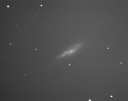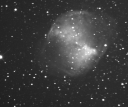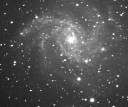Sunday was clear but I knew I’d be up at 6:30am for work so thought it best not to image into the early hours. Instead I completed converting my PC to Linux and set about looking for image processing tools. Hmmm, I’ve been spoiled with the options available to me under Windows and now I’m struggling to find anything that will stack multiple FITS. I can do post processing using the GIMP but without a stacking option (and histogram stretch options) I found I had to revert back to K3CCDTools under Windows. I ran Windows in a VMWare session though ![]()
Monday was clear but by the time I get home from Karate it’s too late to set up and I don’t have the energy anyway ![]()
So here we are on Tuesday, a clear sky, the nights drawing in and I have everything set up by 7:30pm. I decided to pick out some old friends towards the North, which turned out to give me an insight into the issues I have with mount movement. Focusing my attention on object close to the meridian I was able to increase exposures to 60 seconds in some cases. I had to discard a large number of frames, but those that were usable had much better dynamic range than the 10, 20 and 30 second shots I’d been taking recently.
 NGC4605 – Galaxy |
 M27 – The Dumbbell Nebula |
 NGC6503 – Galaxy |
 NGC6946 – Galaxy |
 NGC5907 – The Splinter Galaxy |
I returned to NGC6946 to see if there was any trace of SuperNova SN2008S. I had taken images in January and February around the time this SuperNova was discovered and wanted to see if anything remains. I’ll have to create one of those blink images to show where it is, not tonight though.